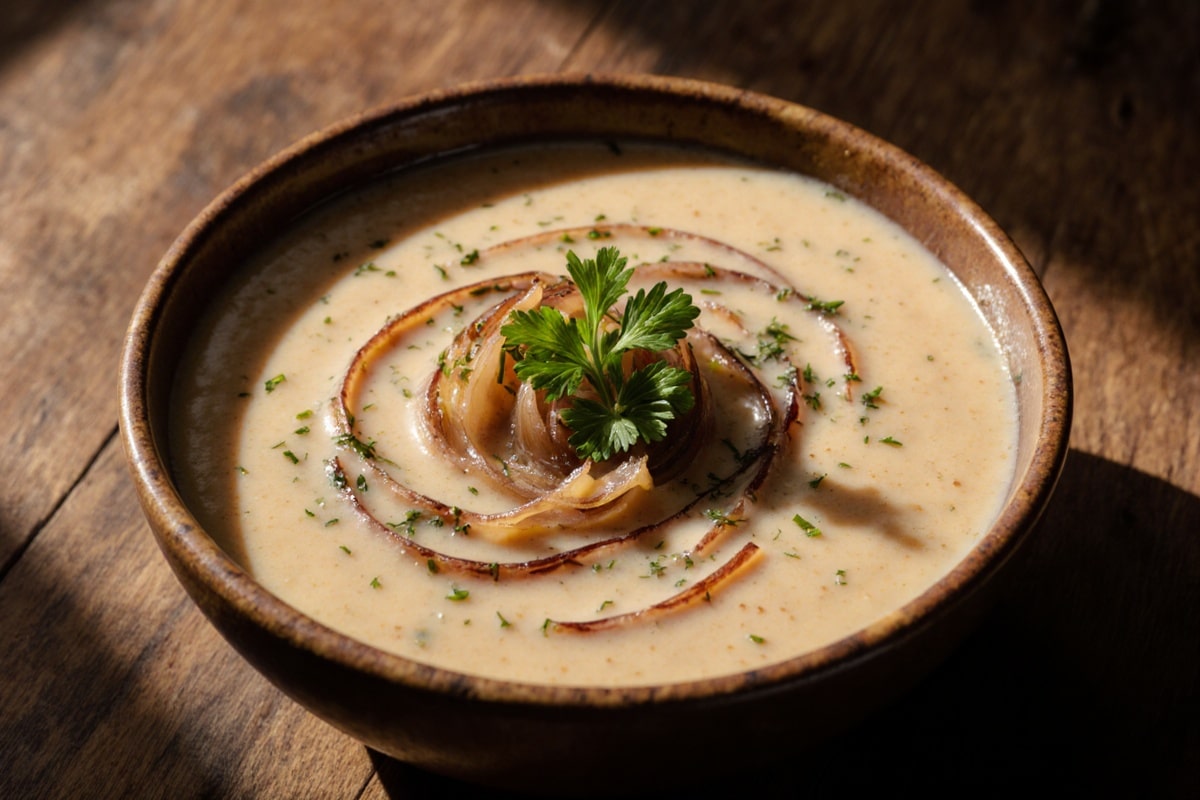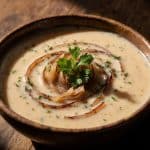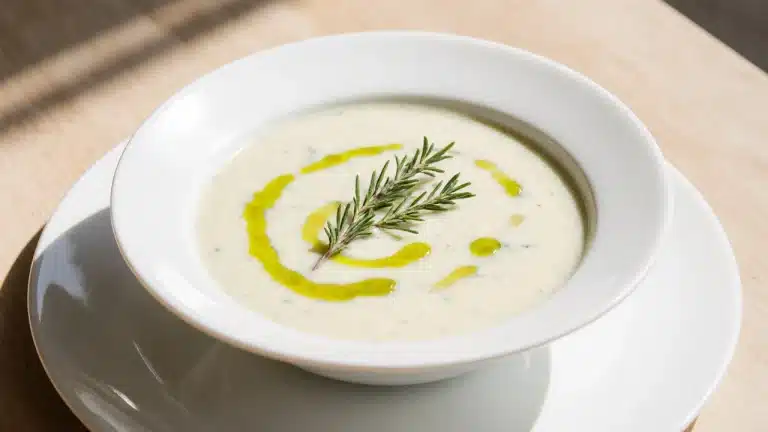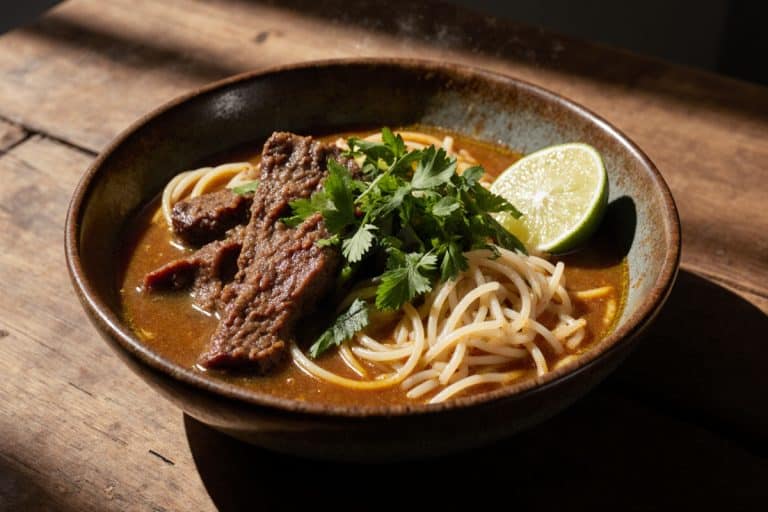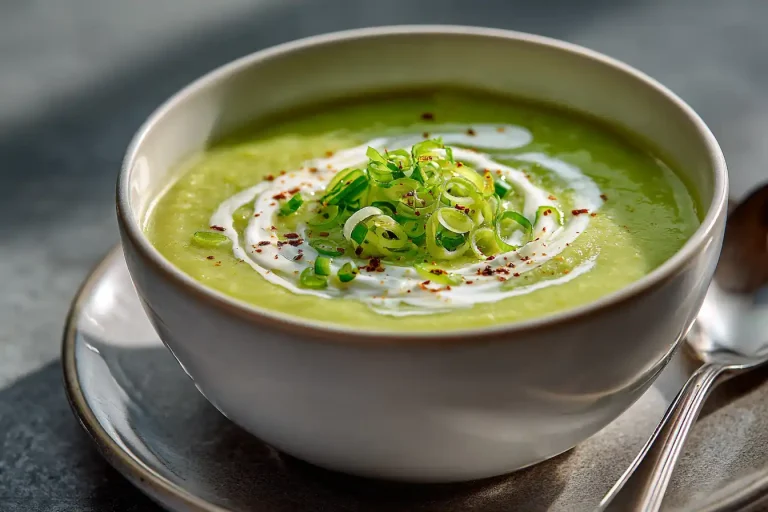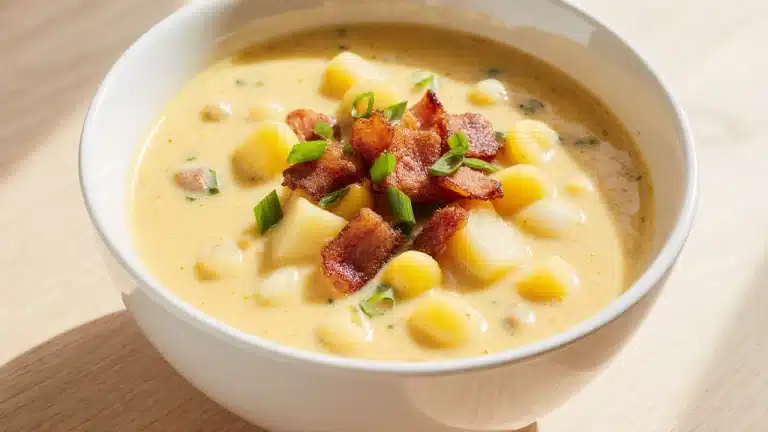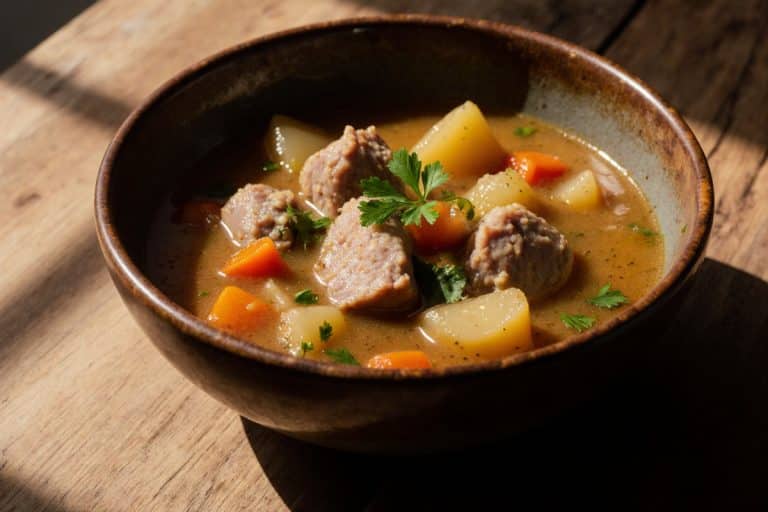Gordon Ramsay White Onion Soup
When I first attempted Gordon Ramsay’s white onion soup, I nearly destroyed my kitchen and my culinary confidence. Three burnt batches, two smoke alarms, and one very frustrated wife later, I realized this wasn’t just a recipe—it was a precision art form. The magic isn’t just in the ingredients, but in understanding how each onion slice transforms under controlled heat. What I learned wasn’t just how to make soup; it was how to respect ingredients, control temperature, and create something that looks like it came straight from a Michelin-starred kitchen. This recipe is about more than food—it’s about turning humble ingredients into a creamy, soul-warming experience that’ll make your dinner guests think you’ve been secretly training under Ramsay himself.
Ramsay’s White Onion Soup
Ingredients
Equipment
Method
- Heat olive oil and butter in a Dutch oven over medium-low heat. Add finely sliced onions and cook for 20-25 minutes, stirring occasionally, until caramelized and golden.
- Add minced garlic and sauté for another 2 minutes until fragrant.
- Pour in the vegetable broth, scraping up the browned bits from the bottom of the pot. Let simmer for 15-20 minutes to allow the flavors to meld.
- Using an immersion blender, blend the soup until smooth. Return to low heat and gently stir in the heavy cream. Be careful not to boil.
- Season to taste and let rest briefly before serving. Garnish with fresh herbs.
Nutrition
Notes
Love this recipe?
Give us 5 stars and comment!Ramsay’s White Onion Soup: Understanding the Culinary Journey
Reader Expectations & Goals
If you’re looking for a comforting soup that feels sophisticated, you’ve come to the right place. Gordon Ramsay’s white onion soup is more than just a recipe—it’s a way to turn simple ingredients into something special. Patience is key here, as you’ll want those onions to reach a beautiful, golden, jammy stage.
Keywords & Entities
This is not your grandma’s soup. We’re diving into a white onion cream soup recipe that showcases Ramsay’s signature bold approach. Terms like “slow caramelized onions” and “Ramsay cooking technique” serve as your guideposts toward soup perfection.
Related Culinary Elements
Your essential ingredients include white onions, unsalted butter, olive oil, and an immersion blender. Think of these as your culinary team, all ready to work together to craft a delicious dish under careful control.
Nutrition & Health Overview
Per 100g Breakdown
Each serving offers a satisfying nutritional boost: 60-80 calories, 1.5-3g protein, and 6-8g carbohydrates. The natural sugars that come from caramelized onions make this a fulfilling choice.
Health Advantages
Onions are not just tasty; they’re nutrient-dense and packed with antioxidants. They’re rich in vitamin C, provide fiber, and contain a moderate amount of fat that gives the soup a rich texture. Plus, using controlled sodium levels means you won’t be overwhelmed by salt.
Potential Nutritional Considerations
Keep in mind that the higher fat content from butter and cream may not be suitable for very low-fat diets. Watch the sodium, too, especially if you’re not careful with your broth selection. Pro tip: Choose low-sodium broths and season wisely.
Cooking Method Comparisons
Slow pan caramelization is the way to go. Instead of using the oven, 20-30 minutes of gentle heat creates rich, complex flavors without the risk of burning. The blending process ensures a smooth texture without adding too much fat.
Recipe & Method: Ramsay-Style Technique
Essential Ingredients
You’ll need four large white onions, unsalted butter, olive oil, garlic, vegetable broth, heavy cream, and an assortment of herbs. Using quality ingredients is a must. Every single component adds to the overall depth of flavor.
Caramelizing Onions Perfectly
Stick with medium-low heat for the best results. The butter and oil together create the perfect environment for caramelization. Twenty to twenty-five minutes of slow cooking will turn those raw onions into a golden delight. If you rush it, you’ll ruin the flavor.
Building the Flavor Foundation
Add in the broth and scrape up those beautiful browned bits from the bottom of the pot. A gentle simmer for 15-20 minutes lets the flavors meld and create richness. Consider this your flavor foreplay—take your time.
Blending and Finishing Techniques
Whether you use an immersion blender or a standard blender, smoothness is your goal. Bring the mixture back to low heat and carefully stir in the cream and herbs. Don’t let it boil after adding the cream—that’s a rookie mistake.
Common Mistakes and Fixes
Burned onions? You’ll need to start over. If the soup isn’t caramelized enough, it’ll lack soul. For cream that’s curdling, gentle heat is essential. When it comes to seasoning, this is where Ramsay’s technique shines—be daring and adventurous.
Ramsay’s Signature Techniques
Heat Control Mastery
The right temperature matters. Keep it medium-low for caramelizing and gentle for warming the cream. No exceptions.
Seasoning Philosophy
Season boldly at the end. This isn’t simply about salt—it’s about bringing every subtle flavor to life.
Resting and Texture
A short rest after caramelization enhances flavor and ensures the ideal blending texture.
Cream and Herb Finishing
Heavy cream and fresh herbs are not just extra touches—they’re the finishing strokes on your culinary masterpiece.
Delicious Variations
Regional Twists
Adding a splash of dry white wine or sherry can introduce delightful depth. Want to spice things up? A dash of smoked paprika or cayenne could do the trick.
Protein Enhancements
Some crispy pancetta or a swirl of crème fraîche can take this soup to an entirely new level.
Complementary Sides
Pairs beautifully with toasted garlic baguette, Gruyère croutons, or a light vinaigrette salad.
Serving Suggestions
Fresh herbs and some crusty bread let the soup take center stage.
Prep, Tools, and Precision
Timing and Temperatures
Caramelization: 20-25 minutes. Garlic sauté: 2-3 minutes. Simmering: 15-20 minutes. Being precise is key to getting great flavor.
Essential Equipment
A Dutch oven and an immersion blender are all you need—no fancy gadgets required, just solid tools.
Finishing Guidance
Warm gently. Season with confidence. Let the soup speak for itself.
Garnish and Presentation
Chives, parsley, and crusty bread bring simple elegance to your presentation.
To learn more about white onion soup, check out this resource.
Video tutorial: white onion soup

FAQ – gordon ramsay white onion soup
Question: How long does it take to caramelize onions perfectly?
Answer: 20-25 minutes of patience. Rush it, and you’ll burn them. Slow and low is the mantra.
Question: Can I use yellow onions instead of white?
Answer: You can, but white onions provide a cleaner, more delicate flavor. Stick to the recipe for best results.
Question: Is an immersion blender necessary?
Answer: Not mandatory, but recommended. A standard blender works, but immersion blenders give smoother control.
Conclusion
Here’s the brutal truth: this soup isn’t just a recipe, it’s a culinary journey. When you nail those golden, jammy onions, when the first spoonful hits your tongue with that rich, velvety texture—you’ll understand why Ramsay is a legend. This isn’t just cooking; it’s transforming simple ingredients into something extraordinary. The kitchen becomes your canvas, and every stir, every careful temperature adjustment is a brushstroke of flavor. The first time you serve this soup, watch your guests’ eyes light up. That moment? That’s when you know you’ve not just cooked a meal, but created an experience. Now it’s your turn. Get in that kitchen, channel your inner Ramsay, and make some magic happen.

